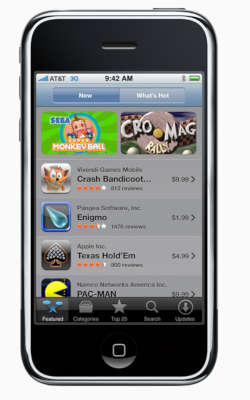| Ten Years Of The Apple App Store |
| Written by Lucy Black | |||
| Wednesday, 11 July 2018 | |||
|
Ten years of the App Store - is it time to celebrate? Or is it time to reflect back on what we have lost and what has been gained?
Back in 2008 the programming world was a very different place. Smartphones were relatively new and the iPhone was still an exciting newcomer. As programmers we probably didn't think that what was about to happen was even possible. The idea that a single company could lock down a platform so that it controlled what programs ran on it was hard to imagine - let alone believe. After all, computers up to this point had been relatively open platforms. You bought a computer and it was yours to run whatever you wanted. Given that a program is a collection of bits in memory it didn't even seem possible to lock down a system in the way that the iPhone is locked down. Software, by its very nature, is open and freely copyable - unless you put a lot of effort into making it otherwise. The loss of freedom is regrettable, but what has been gained? A big new market. Arguably that market would have been there anyway and, if it was a free market, then Apple would not have made more than an estimated $100 billion over the time, but programmers would be that much better off. The App Store currently claims to have over 2 million apps and 20 million registered developers, although a large proportion make little to nothing from their work. When it comes to software, marketing and support count for a lot and Apple does very little to help in this area. Then there are the issues of freedom to create any software you care to think of. You have to abide by the App Store rules and regulations and if you don't your app won't get into the store. Worse, if it is retrospectively found to be breaking a rule then it gets kicked out. No right of appeal and if you talk to journalists then Apple has no intention of helping you at all. That this is an authoritarian regime isn't a point that you can argue against. But what of the benefits? The only credible benefit is that Apple's curation of the store makes it safer for innocent users to download and use apps and this security makes the market more viable. The argument is that you sell more apps because the user feels able to try things out. Is this true? I doubt it.
You might be happy with Apple's stewardship of the App Store, but that is probably just a result of you being fortunate enough not have bumped into the walls of the walled garden and felt the displeasure of the faceless App Store apparatchiks. Even if you are happy, you could spare a moment to consider what the App Store model has done to the rest of the ecosystem. Consider Microsoft. It long had an objective to convert software into a service so that it could benefit from a long term revenue stream. This was bad enough, but then along comes Apple with a locked down ecosystem and lots of profits. What's a company to do? You could put the blame on Apple for the entire Windows 8, WinRT, Windows Phone fiasco. No, I'm not barking mad. What do you think drove Microsoft to rip up the Win32/64 API and start over with WinRT? Was it a technical need or the need to lock down the infrastructure so that a Windows Store could rise to dominate everything. Windows Apps are almost as locked down as iOS apps. Only Google made the stupid mistake of letting Android go open source and it has been working steadily to take control back ever since. Assuming Android is still around in ten years time, my bet would be that the Play store will be just as much a walled garden as the others. You can see the App Store as a great opportunity making it possible for lots of smaller business to enter the market and supply innovative apps that otherwise would not have existed. However this misses the point that phone apps aren't in the same league as desktop apps, or even cloud-based systems. These are still in the hands of a few large companies and things are likely to stay this way, App Store or no App Store. The App Store is mostly full of small apps that do frivolous things - it's a trinket store. Let's get back to real computing.
More Information
Fear and Loathing In The App Store
Epic Games CEO Finally Notices That UWP Apps Are A Walled Garden To be informed about new articles on I Programmer, sign up for our weekly newsletter, subscribe to the RSS feed and follow us on Twitter, Facebook or Linkedin.
Comments
or email your comment to: comments@i-programmer.info
Comments
or email your comment to: comments@i-programmer.info |
|||
| Last Updated ( Thursday, 12 July 2018 ) |




